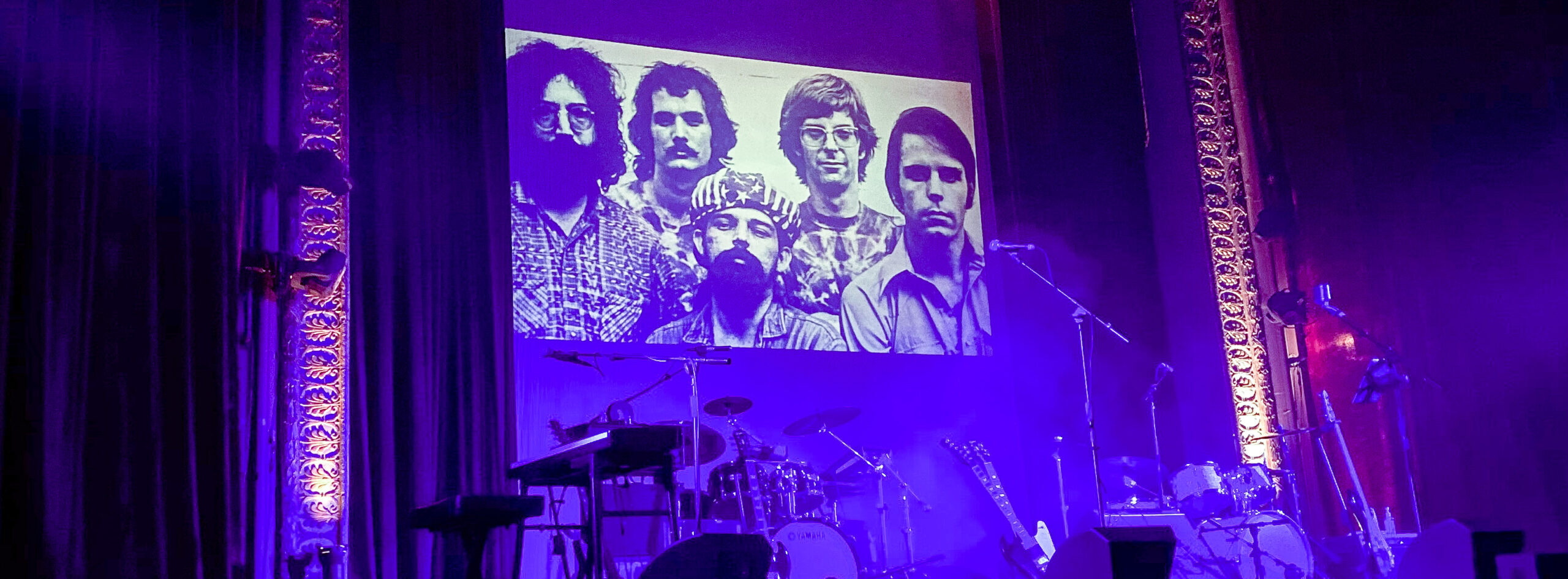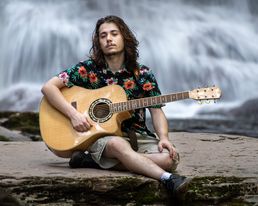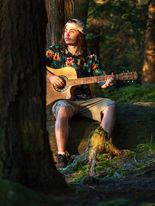Delaware County, Pennsylvania or ‘Delco’ rests adjacent to the land beyond the Delaware River and the great city of Brotherly Love: Philadelphia. Founded in 1682, Philadelphia possesses some of the most ancient musical roots which were formed by German Protestant immigrants, as well as through the unorthodox English and Italian artists and Bohemians.
Philadelphia is also home to famous operas, orchestras, and some of the earliest jazz ensembles. Famed jazz musician, John Coltrane lived in Philadelphia and fostered a broad following in the historic city. Rock and Roll was led in Philadelphia by Bill Haley and the Comets, and the Philadelphia soul scene produced such fame as Patti LaBelle.
Over the centuries, the music scene in Philadelphia has transformed to incorporate all genres. Which is why it isn’t any surprise that the music of the Grateful Dead, which incorporates and transcends the spectrum of categorial music has made its impact upon Philly and neighboring Delaware County. And during the pandemic of 2020, the Delco Music Scene exploded and brought forth some big musical players.
Groups like the Muskrat Flats and Three Fourteen, as well as independent artists like John Taylor and Zac Ciabattoni aka Zac Chap began showcasing their talent through platforms like the Delco Quarantine Open Mic, which Zac says, “went viral.” John Taylor, Tara Ambrosine, and Zac Chap created the popular Facebook Group on March 16, 2020, on the brink of the pandemic, and the start of a lockdown. Ciabattoni grew up in the Delco, Pennsylvania area where he grew up listening to and connecting with artists like Richie Havens, Bob Dylan, and The Beatles. He says, “I’ve always had a very old soul and it was meant for writing and playing music.”
In 2018, Zac released his first EP titled “Wingless” during which time he had suffered the loss of his friend Sean and was recovering from bronchitis. Using a headset microphone, Ciabattoni recorded the EP in his bedroom, mixed it, and put it out into the world.
Last week, I spoke with Zac about his journey as an artist, the messages of positivity and hope that emanate from his songs, and the road to his upcoming album, “Formal Reflections,” which is set to release in 2022.
AF: Who initially got you into some of your biggest musical influences?
ZC: I would like to thank my parents and my grandmother Susan for getting me into classic rock, which led me later down the folk path. But my friend Ryan and I would meet up after school. We both picked up the guitar at the same time and we really didn’t know what we were doing, and we both had very different music tastes, actually. He was more into indie, blues, and stuff from around the world, whereas I was listening to American and European music from the 50’s era to now. Ryan was listening to more modern stuff, more folk stuff, and he got me into some of the YouTube ‘sessions’ type of videos with bands like Bears with Guns, a whole lot of bands I’d never heard of. So, I was always into the older stuff myself, but he got me into some of the new stuff. In turn, I started showing him some of the older stuff; the stuff that sort of built our path.
AF: Are your parents musicians?
ZC: No, my parents never had interest in playing music. The only thing they really showed me as a kid were the classic rock stations like WISP. One of my earliest memories was singing along to every word of “Behind Blue Eyes” by the Who at like seven or eight years old. And I remember my second-grade teacher asked, “What’s your favorite band?” and I put “Led Zeppelin,” and she goes, “Well how the heck do you know Led Zeppelin?” It was pretty neat.
AF: Why did you want to play guitar?
ZC: I think it was an outlet for high school drama, girl trouble, family troubles, loss, and life. So, guitar was that one thing I could turn to when I felt nobody was there. And I had friends who had interested in it as well. It was like they were saying, “I’m going through the same struggles as you”, which was a beautiful part of the early days.
I always had a passion for writing growing up, and I had this teacher Mrs. Barbara Jackson who was pretty much my biggest influence writing-wise. She pretty much gave me the paper and the pen and showed me what freewriting was. Writing really was my first outlet, and then when I picked up guitar and I was able to write my own songs, that’s when it clicked and I said, “I can do this!”
AF: In the early years, what was the best song you came up with?
ZC: *Laughs* That’s such a funny question because I was just thinking back on this song the other day. It was two chords, the C major and F major chords. I put the capo up as far as it can go on the 10th fret, so it was a super high-pitched song called “Hold On,” with a simple little lyric like, “Hold on, don’t let go, is there some way out of here…” So, there was the C,F riff with an A, E, E7 chord progression. I knew nothing about music theory, and so it was the most basic song, and it was terrible, but it was the beginning of the long journey I’m walking now.
AF: What made you want to become a full-time musician?
ZC: It was a puzzle that sort of put itself together. Like the universe said to me one day, “It’s your turn.” I always knew I was meant to do something. When I was a kid, I had a near-death experience and it sounds crazy, but something said to me, “it’s not your time.” I still question it you know what I mean? I think guitar is a piece of that, for sure. I never really wanted to play live, I never really wanted to be a professional musician, mentally or physically. It became more of a spiritual thing, like I have to do this.
What really was the trigger was that I got a chance to see Paul McCartney live. My friend Charlie called me on lunchbreak the day of the show and surprised me by asking, “You wanna go see Paul tonight?” I had been trying to get tickets to the show for weeks, but they were sold out. At the time, Charlie’s Uncle owned McFadden’s, the bar at Citizen’s Bank Park so he had skybox seats for pretty much every show, every Phillies’ game.
It was very surreal because it was almost like he knew people were watching him who would be influenced by him. Like, he wasn’t doing it for the money, he wasn’t doing it for the crowd, but he wanted people watching him who would continue where he leaves off. It was as if he was saying, “If you want to play live, this is what you have to do. You can’t just guess, it’s a privilege to be here in my shoes, it takes a lot of work.” In that one concert alone, I felt like I was downloading information I needed: “The next step is to go play live somewhere.” And this happened again when I saw Bob Weir solo, and then Dead & Company a few months later. I saw all of these musicians who continue to push themselves, and they’re not doing it to make money. They’re doing it because they love what they do. That was the biggest push for me. That led me to play The Burlap and Bean in Newtown Square that same year. I think it was two months after the show actually.
AF: What are some of your biggest goals moving forward as a musician?
ZC: I want to continue to influence and inspire people to found what they want to do. The only goal is to help other people find their niche. It’s not very often you’re 18 and you know what you want to do for the rest of your life. It’s a beautiful thing but it’s also overwhelming trying to find your niche or figure out where you wanna be. So, I want to help people accomplish their goals and to also bring them out of dark places. One of my biggest musical influences was Chester Bennington from Linkin Park. Mental health awareness is another critical goal of mine, you know I wanna bring people out of their darkness and be their sunshine on a cloudy day.
AF: Thank you for that. It’s so important to be there for those who can’t be strong every day.
ZC: And I’m not either. We’re in this together. There are times when even I’m down on my luck and I need to reach out to somebody. So even though I’m trying to be this guy who spreads positive energy, it’s important to say that even I have issues. That’s something you’ll get from my music. It’s almost a bittersweet feeling, like here’s this soul trying to spread positivity while fighting its own demons.
AF: What other messages would you say come through in your songs?
ZC: For me, every song is a bit different. “Wingless,” my first accomplished EP, has the central message of “We don’t have wings, but if there’s something there that’s always guiding you, then you can soar.” My newest song “Communicate,” is basically about me saying to myself, “hey, I need to talk with people more,” but also, “I think we need to communicate with each other better.” A lot of my songs are self-reflecting.
There’s a song on the “Wingless” EP called “Something is Close,” and it says, “We pray something is close/To us now even though/We know they’re not here/To stay, probably seems psychotic to you/I disagree”.
These lyrics embody this idea that there is something guiding us. That was the first real song where I was like maybe I should write to help people, instead of just writing to sell records or to make people dance. Sure, it’s gonna be a little tougher to sell the records but people will find true value and meaning in this music, like all of the people before me. We have a responsibility to our musical forefathers to make Americana flourish within this Digital Age. I think within the next five years or so, the Delco Music Scene is going to get out there and influence people for the better, hopefully influence the radio as well. I do think there’s a lot of talent in our scene.


